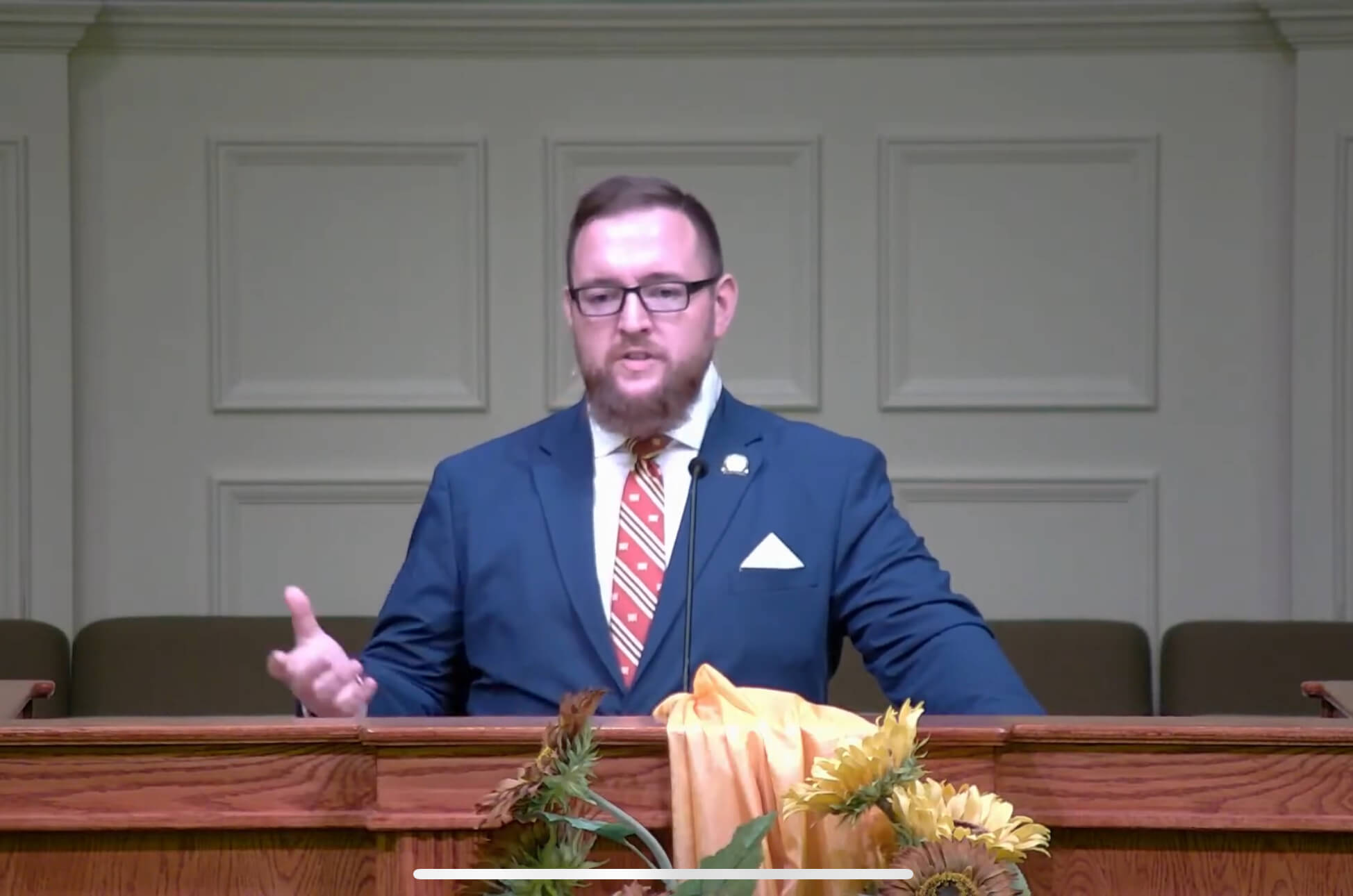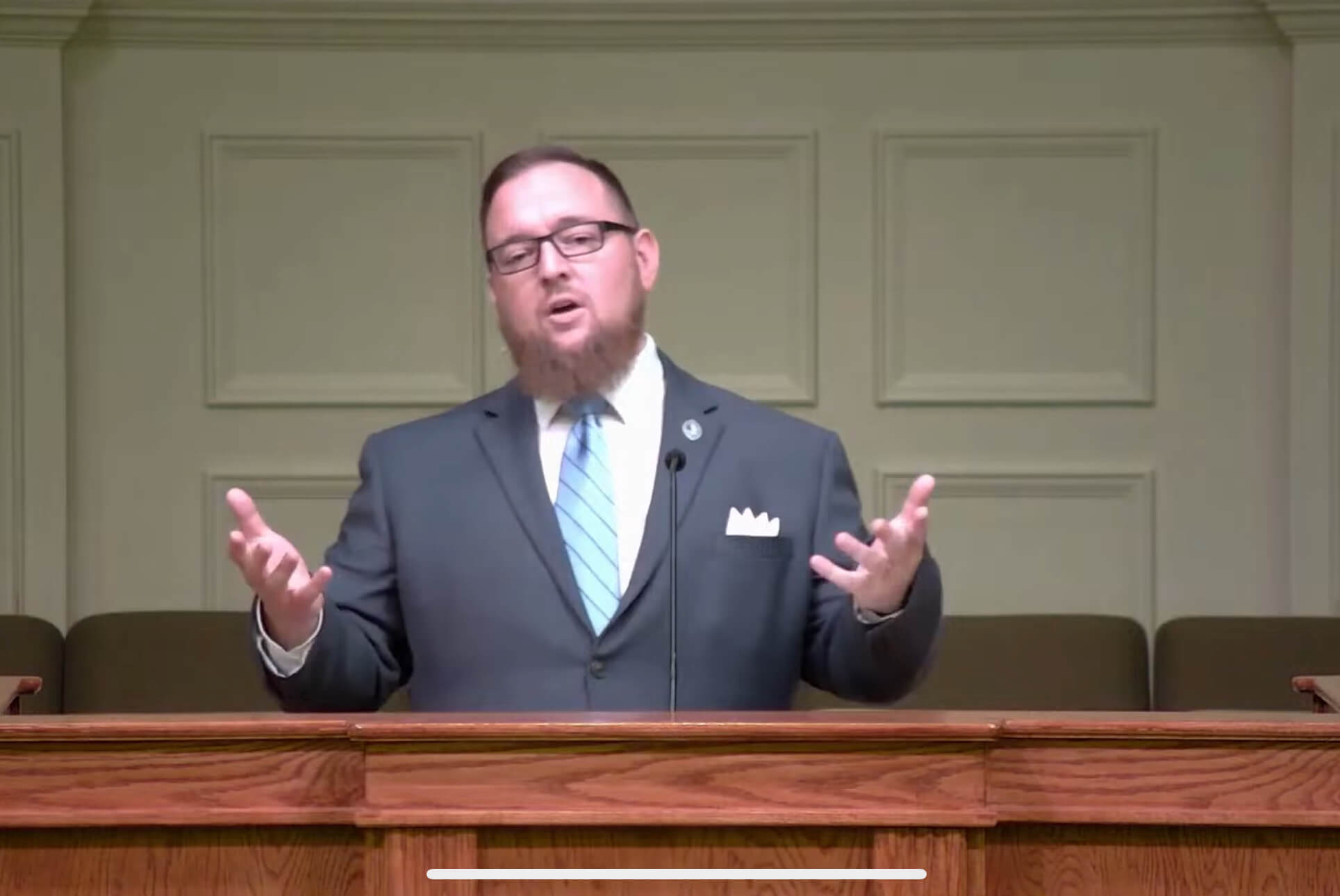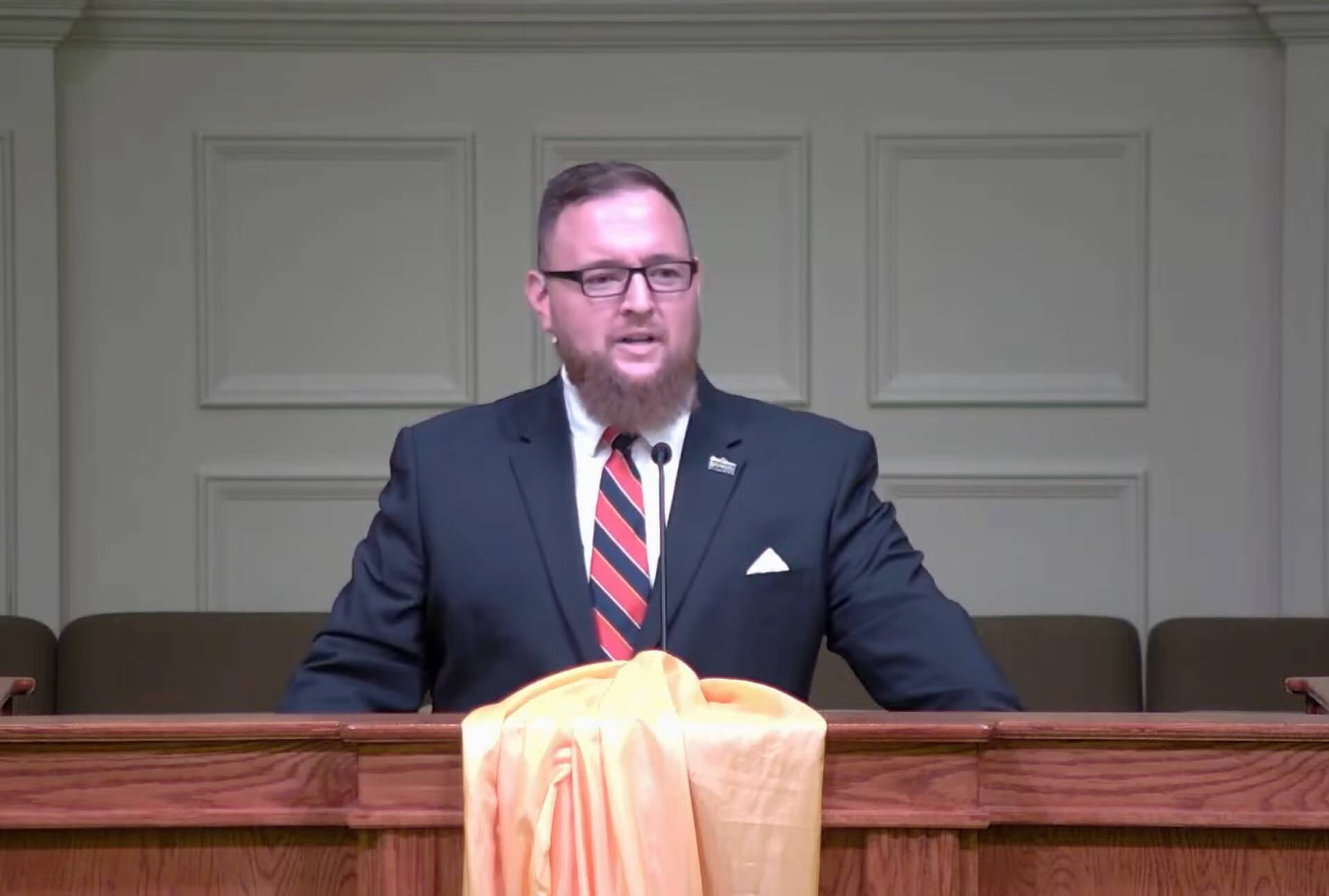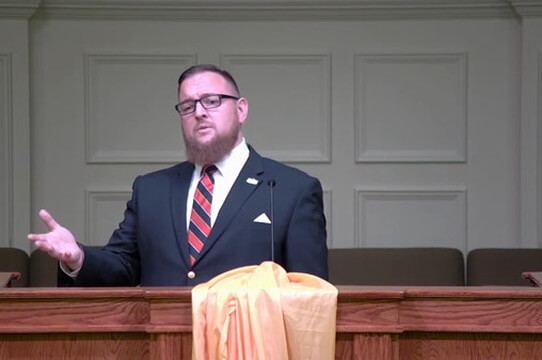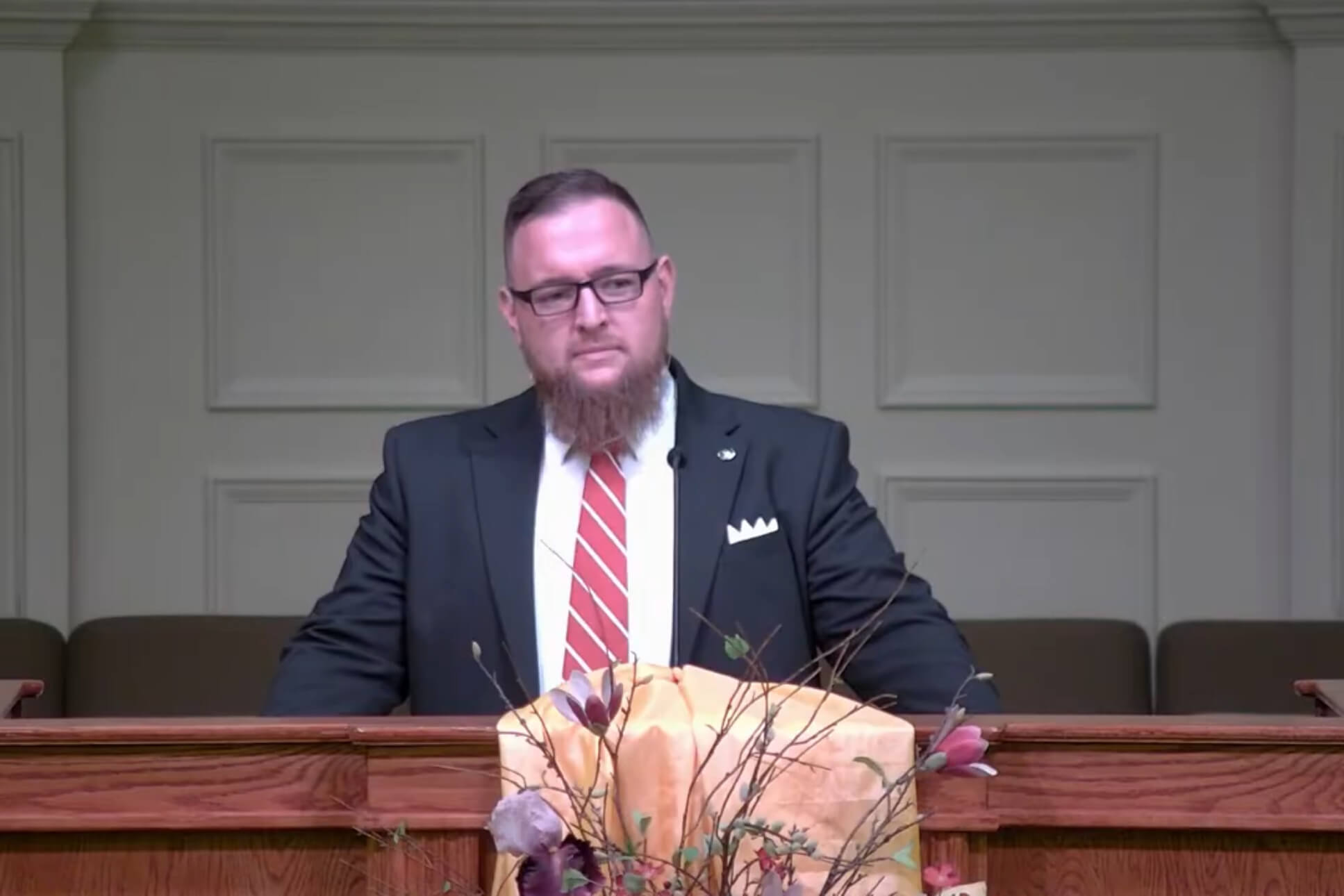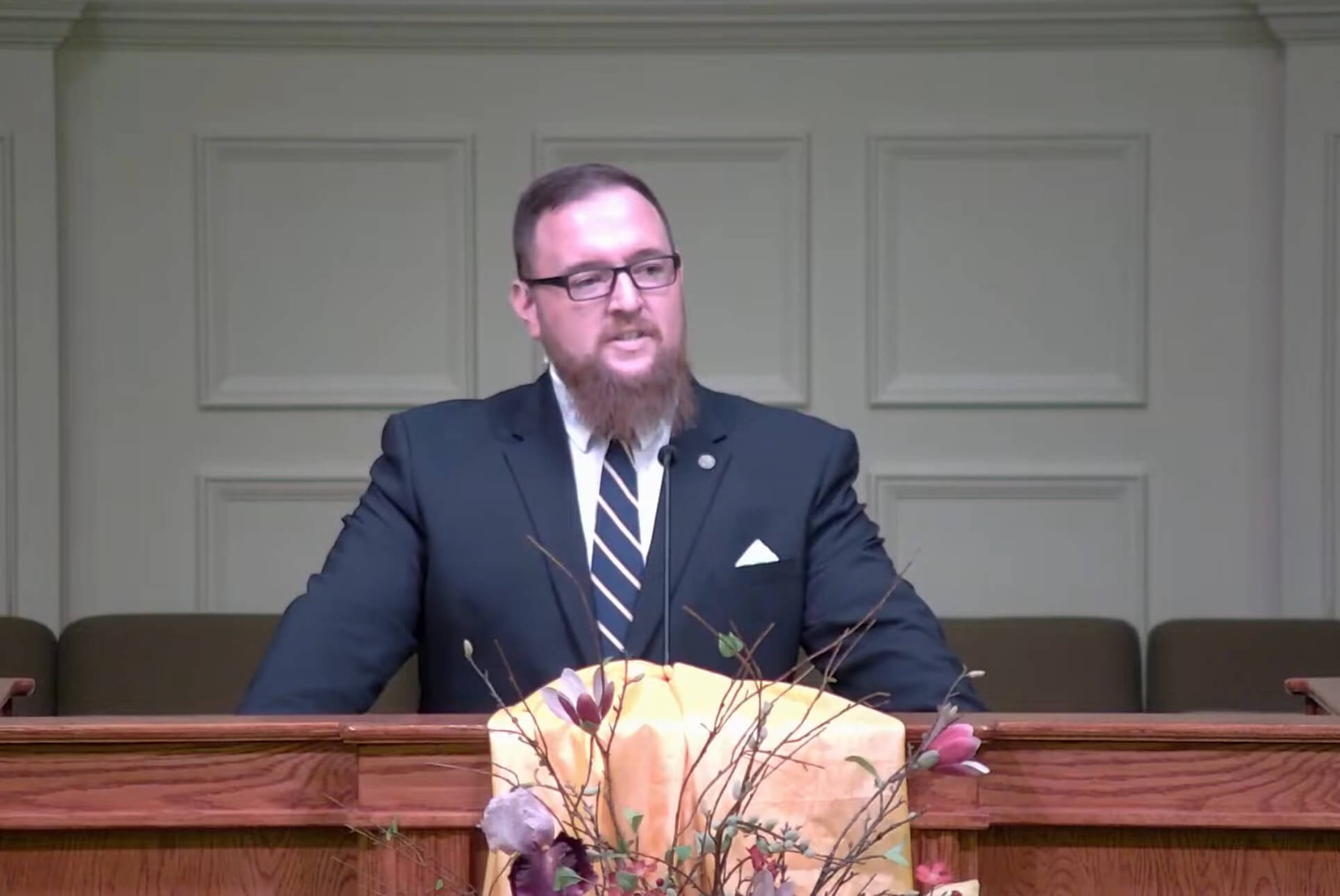Video
“How to Pray”
Psalm 5
Pastor Ryan J. McKeen
07/28/24
Video
Transcript
We did some older songs this morning and we did some newer ones this evening, kind of balance it out a little bit.
Turn with me and your Bibles to Psalm chapter five. We’re going to continue in the Psalms this evening. I finished up 1 John before I left for California a couple of weeks ago, and I plan to pick up 2 and 3 John in the coming weeks. I’ll probably start that next week. Tonight I wanted to continue with another psalm following up from this morning as we did Psalm 44, and so tonight we’re going to be in Psalm chapter 5.
And the title of this sermon is How to Pray. Now that may not be what is often thought of when you think of Psalm chapter 5 and you read Psalm 5, but really I think we see kind of an example of prayer here. Prayer is really an essential part of our Christian life. We know this because the Bible is full of prayers. It’s full of the prayers of God’s people.
Charles Spurgeon once said, prayer pulls the rope below and the great bell rings above in the ears of God. Some scarcely stir the bell for they pray so languidly. Others give but an occasional pluck at the rope, but he who wins with heaven is the man who grasps the rope and boldly pulls continuously with all his might. I think that’s a nice, well-worded summary of what prayer is and how we should be praying.
Praying should be a central part, the heartbeat of our Christian life. It is our conversing with God. God speaks to us in his word and we speak back to him in our prayers. Prayer is really an expression of our faith. We only pray because we have faith that God is there and that he hears us. Otherwise, we wouldn’t pray. So even the act of praying is showing that you have faith. You have faith in who God is. John Calvin called prayer a conversation with God and an intimate conversation with God.
So it’s in our prayers that we speak back to God. And that’s what we see in the Psalms. A lot of the Psalms are just direct prayers. This prayer is a prayer of David. And we have many places in scripture that teach us how to pray. Not only through examples, but even the Lord Jesus. He says, this is how you should pray. And then he gives us the Lord’s prayer in Matthew 6 and in Luke 11. And we pray in faith. We pray believing that he does hear us. And another good place to turn to for prayers is, as I said, in the Psalms. In our passage tonight is a prayer of David. And as we approach thinking about how we should pray, Each one of us at regular times should be praying, Lord, teach me how to pray. As we read our Bibles, Lord, teach me how I should pray. We should have this continual attitude of being shaped in our prayer life.
As one commenter, Dale Ralph Davis, he comments this about Psalm 5. He says, “I have a suspicion that in the Holy Spirit’s filing cabinet, there is a folder marked instruction in prayer. And inside, among others, is a copy of Psalm 5.” I think that’s a good way to look at this Psalm. It’s a model of how we can be praying.
Now there are different types of prayers that we pray, and we see that throughout the Bible. You see the short little prayers like Nehemiah, where he just, God help me. In the time where we just need an encouragement or a help from God in a certain situation, we can just shoot up a prayer, God help me with this. But there are other times, like we’ll see tonight, where we can spend a little more time and really think through what it is we’re praying and how we’re praying.
In this psalm, David teaches us how to pray through his own example of prayer. He really gives us a tutorial on how to pray. And as we approach this psalm, we really see four steps in his prayer. We see verses one through three of preparing yourself to pray. Then we see the second step of knowing who you’re praying to, knowing your God. That’s verses four through six. Then the third step is finally making your request. That’s verses seven through nine. And then lastly, David declares his confidence. And I think we can take some instruction from that. And I think that’s how we see David’s prayer divided up here into these four steps of prayer. And I think that’ll help instruct us in one way that we can be praying.
So I’m going to read our passage this evening. This is Psalm 5. This is the word of the Lord. Give ear to my words, O Yahweh. Consider my meditation. Give heed to the sound of my cry for help, my King and my God. For to you I pray, O Yahweh. In the morning you will hear my voice. In the morning I will order my prayer to you and eagerly watch. For you are not a God who delights in wickedness. Evil does not sojourn with you. The boastful shall not stand before your eyes. You hate all workers of iniquity. You destroy those who speak falsehood. Yahweh abhors the man of bloodshed and of deceit. But as for me, in the abundance of your loving kindness, I will enter your house. At your holy temple, I will worship in fear of you. Oh Yahweh, lead me in your righteousness because of my foes. Make your way straight before me. There is nothing reliable in their mouth, and their inward part is destruction itself. Their throat is an open grave. They flatter with their tongue. Hold them guilty, O God. By their own devices, let them fall. In the abundance of their transgression, thrust them out, for they are rebellious against you. But in all who take refuge in you, be glad. Let them ever sing for joy, and may you shelter them, that those who love your name may exult in you. For it is you who blesses the righteous one, O Yahweh. You surround him with favor as with a large shield.
This is, again, a prayer of David. But if you notice, not all of it is his prayer. He begins in verses one through three with preparing himself to pray. Notice that David is not praying to a stranger. He’s praying to a God that he knows. He knows who he’s speaking to. He begins, give ear to my words, O Yahweh, consider my meditation. In verse two he says, my king and my God. David has a personal relationship with the one who he’s praying to. And that’s where our approach should begin.
This is an address to our God. This is not just a prayer that we recite or words that we repeat. This shouldn’t be a formula. We are talking to somebody. We are talking to God. We should talk to God like we talk to any person, like somebody who hears us and understands what we’re saying. When we talk to our friends or other people, we don’t recite the same words over and over again. We should talk to God as though we’re talking to somebody. So David begins by speaking to somebody that he knows.
And notice how he describes his prayer. In verse one he says, hear my words. So he’s using words, but then also he says, consider my meditation. So he uses spoken words and he uses broken words, words that he can’t speak. This word can also mean murmuring, this word meditation, or groaning. In Psalm 39:3, it says, my heart was hot within me. While I meditated, the fire was burning. Then I spoke with my tongue. It’s that word meditation that David is using. It’s those words that are boiling up inside you, those words that are in your mind, but you can’t quite get them out yet. This murmuring here seems to be like that. It’s sometimes those deep concerns that we have that we can’t quite get into words.
And David asks the Lord to consider them, to understand the thoughts that he has that he can’t quite get out. It’s almost as if David already knows what Paul’s going to write in Romans 8:26. In the same way, the spirit also helps with our weakness, for we do not know how to pray as we should, but the spirit himself intercedes for us with groanings too deep for words. We know that the Spirit hears us and intercedes when we don’t know the words to pray. And that’s what David’s talking about here. Consider my meditation. He’s asking God to, Lord, hear my thoughts. You ever ask God to hear your thoughts? Do you want God to hear your thoughts? David understands who he’s praying to.
He says in verse two, Give heed to the sound of my cry for help. So his prayer is not just calm and stoic and repeat after me type of prayer. He’s crying for help. It’s driven by the urgency of his situation. But even in all of this desperation and this cry for help and the words that he can’t quite get out, David says that his words are ordered. His words are careful. He says in verse three, O Yahweh, in the morning you will hear my voice. In the morning I will order my prayer. I think this is something we need to consider. We need to think about what David is doing here.
That word order, it means to arrange or to set into rows. It’s used in Leviticus chapter one to speak of the priests arranging the wood on the altar or arranging the animal sacrifices in a certain order. The priests had a very specific order they were supposed to do things in. That’s the same word David is using for his words. It’s used again in Leviticus 24 of the arranging of the showbread on the table of two rows of six loaves on the tabernacle table. That’s what David is doing with his words here. He’s thinking about his words and getting them in the right order. He’s thinking about what he’s going to pray. Now this doesn’t mean that we always need to have every single word in order before we pray. But I think this can be instructive for us. Do we ever sit down and think about what we’re going to pray before we pray?
As one commenter, this is kind of a lengthy quote, but he really kind of speaks about this idea of ordering our prayers. And he says, “we find too little of this in the church. We don’t order our prayers. We simply start with our religious rattling and our easy Christian cliches. And then he gives an example here. We just want to thank you, Lord. We’re just really glad to be here. We ask you, Lord, to give us a really good time in your presence and just help us to worship you in spirit and in truth. And then he pauses and says, how many ponder what that actually means? Then he continues, and we’ll be careful to give you all the honor and glory and blah, blah, blah. Then if we need to pad the prayer or boost its earnestness, we can always insert a father or Lord every third or fourth word.” And he’s saying this a little bit tongue in cheek, but he says, “we call this free prayer. Well, it’s certainly free, but I wonder if it’s prayer. Sometimes we may need to revert back to using written prayers.”
And I wonder if that’s something we should consider. Because sometimes when we pray, we get into rhythms, and we start to repeat things, and we get into ruts. But do we ever consider carefully the words that we pray? Do we ever, like David says, order our prayer?
See, he’s speaking here in verse three, in the morning I will order my prayer. This is the day before, the night before. He’s thinking about what he’s going to pray, and he’s telling God, in the morning, I will order my prayer to you.
Thomas Watson, the great Puritan, said, “that prayer is most likely to pierce heaven, which first pierces one’s own heart.” So I think writing out our words may cause us to think about the words we use and let them have their effect on our own heart before we bring them to God. So it might be a helpful practice for us to write out our prayers once in a while. Write down the things that you want to pray for.
Getting those words on paper may help you think about them a little more. Maybe it’s something that after you consider what you’re saying and what you’re praying for, maybe you shouldn’t be praying for that. Or maybe you think a little differently about what it is you are praying for. But if David thought it was important to order his prayer, maybe we should too. Maybe we should think about, and again, this isn’t every time we pray, because there’s sometimes we just need to get it out, but maybe we should make a practice of regularly ordering the things that we pray for. Keep a prayer journal, write down the things that we’re praying about.
So that’s David’s first step here, is he’s preparing himself to pray. He says there at the end, in the morning, in the morning he will order his prayer and he will eagerly watch. So he prays confidently. He prays expecting to hear something, expecting to see something. Because, comes to verse four, and the next step in his prayer is to know your God. Verse four says, for you are not a God who delights in wickedness. Evil does not sojourn with you. The boastful shall not stand before your eyes, and you hate all workers of iniquity. You destroy those who speak falsehood. Yahweh abhors the man of bloodshed and deceit.
That’s David’s description of God. This is the reason why he’s eagerly watching after he prays, because he knows who God is. He knows what God is like, and that’s shaping how he orders his prayer. Verse four begins with the word for. This is the reason why he said what he said in verse three. Why is he ordering his prayer and eagerly watching? Well, number one, God is not a God who delights in wickedness. It’s giving you a hint of what David’s gonna pray for. God is not a God who delights in wickedness. Then he says, evil can never sojourn with God. This means it can never be a house guest with God. God cannot dwell with evil. And then he says, boastful men will not stand in his presence.
And that’s all great, that sounds good, and you’re saying amen. But then David takes it a step further. He goes a step further than a lot of people are comfortable going. He says in verse five, you hate all workers of iniquity. You hate all workers of iniquity. And then he continues. You destroy those who speak falsehood and Yahweh abhors the man of bloodshed and deceit.
And you’re like, whoa, whoa, whoa, David, easy now. You can’t say that. God is good and hate is bad and therefore God doesn’t hate, right? See, we have such a, I don’t know, babied down view of God. We make God out to be this harmless, nice guy that doesn’t offend anybody. The Bible says God hates sinners. God is so ambitious for his righteousness that it necessitates that he hates sinners. And this verses five and six really blows up the idea of God hates the sin but loves the sinner. That’s an unbiblical statement because it says God hates the sinner.
It doesn’t say that he just hates evil, he hates evildoers. He doesn’t just abhor bloodthirsty deeds, he abhors bloodthirsty men. That word abhor is actually stronger than hate. David’s intensifying his description of God’s view towards sinners. The word abhor means to detest or define reprehensible or abominable. That’s what God thinks of bloodthirsty men, men who shed blood and are characterized by deceit. These are not just acts, these are people. And this is how God speaks of the vile and disgusting idols of the pagan nations.
In Deuteronomy 7 verse 26, speaking of these idols of the nations, he says, you shall not bring an abomination into your house and become devoted to destruction just like it. You shall utterly detest it. You shall utterly abhor it, for it is devoted to destruction. And in Psalm 5, David says that God feels the same way about sinners. He uses the same word. God feels the same way about murderers and liars. This is part of knowing your God before you pray. You do not pray to some apathetic, harmless, nice guy. You pray to a righteous God who loves and hates.
You see, God has a certain character. God is described a certain way in the Bible. And it’s because of this character that David knows exactly what to pray for. He has a real hope that his prayers will be answered because he’s asking for things that are in line with God’s character. He’s not asking for things that will contradict God’s character. He knows who he’s praying to, therefore he knows what to ask for. So how does this instruct us in our prayer life? Well, for one thing, it ought to fill us with praise. David is praising God for the way that he is in just his description.
We read from the London Baptist Confession of Faith, and listen to this simple description of who God is from the confession. It’s all taken from scripture, but they’re all put together in this one statement, and it sounds as though we are praising God when we read it.
This is what it says in chapter 2, section 1, describing God. It says, “the Lord our God is one, the only living and true God. He is self-existent and infinite and in being and perfection. His essence cannot be understood by anyone but him. He is perfectly pure in spirit. He’s indivisible and has no body, parts, or changeable emotions. He alone has immortality, dwelling in light that no one can approach. He’s unchangeable, immense, eternal, incomprehensible, almighty, in every way infinite, absolutely holy, perfectly wise, wholly free, completely absolute. He works all things according to the counsel of His own unchangeable and completely righteous will for His own glory. He is most loving, gracious, merciful, and patient. He overflows with goodness and truth, forgiving iniquity, transgression, and sin. He rewards those who seek Him diligently. At the same time, He is perfectly just and terrifying in His judgments. He hates all sin and will certainly not clear the guilty.”
That’s just a description of what the Bible says about God, and you can’t help but praise God by reading it. Speaking of who God is, what he is like, is itself worship. And that’s what David’s prayer is like. He declares Yahweh’s character, what he’s like. And even in doing that, he slips into praise already. In verse seven he says, but as for me, in the abundance of your loving kindness, I will enter your house. David’s ready to worship. after describing what God is like. And because of the type of God that he is, just like David, we need to know what God’s like before we know what we can even pray for.
Because of who God is, David can make specific requests. For example, when you pray for the governments or the leaders of the world, How do you know what to pray for unless you know what God desires in leaders? When you pray for those suffering around the world for the name of Christ, how do you know that you should even pray for them unless you know that God sees the affliction of his people? We know what to pray for because we know what God is like, because he’s revealed himself in his word. So the second step of our prayer is to know your God.
The third step is to make your request. That’s what we see in verses seven through nine. David finally makes his request. He doesn’t start with, the things that he wants or needs. This is the third step in his prayer. He’s prepared himself, he knows his God, and now he’s making his request.
He says in verse seven, but as for me, in the abundance of your loving kindness, I will enter your house. At your holy temple, I will worship in fear of you. Oh, Yahweh, lead me in your righteousness because of my foes. Make your way straight before me. There is nothing reliable in their mouth. Their inward part is destruction itself. Their throat is an open grave and they flatter with their tongue.
We see two things about David’s request here. He bases it on the grace of God, number one, and number two, it’s all in an attitude of worship and fear. He says in verse 7, but as for me, this is an emphatic use of the personal pronoun. He says, but me, even me, as for me. David has just testified to what God is like and what evildoers. are like in his presence, how God feels about evildoers and bloodthirsty, deceitful men.
And then he follows that up with, but as for me, and you might expect him to contrast himself with those evildoers. God hates evildoers and bloodthirsty, deceitful men, but as for me, that ain’t me. I’m pretty good. I’m an honest guy. That’s not what David says. He says, but as for me, Only by the abundance of your loving kindness do I come into your house. David doesn’t say, well, they’re not worthy to worship you, but I am. He says, God hates evildoers, and therefore, it’s only in the abundance of his mercy that I’m able to come.
It’s only in his loving kindness David’s not saying, I’m better than those guys. He’s saying, I’m no better than them. And it’s only by God’s grace that I come to him. It’s God’s love and patience and mercy. And he comes in fear. He says, at your holy temple, I will worship in fear of you. First, we see at the beginning of verse seven the welcome friendship of acceptance and grace, that God welcomes him in. And then at the end of verse seven, we see the fear, the trembling before the majesty of God. At God’s holy temple, David will worship in fear. You see glad welcome and trembling fear. That’s the attitude of worship.
As I was studying this passage, there was one commenter who told a story to illustrate this welcome and fear. He told the story of a Greek painter who had produced a remarkable painting of a boy carrying a basket of grapes on his head. The painting was so realistic that when the painting was displayed, birds came and tried to eat the grapes because they looked so real. And his friends praised him, like, you’re an amazing painter. Look at that. The birds even think it’s real. That’s how realistic your painting is. But the painter was upset. He said, I should have done a great deal more. I should have painted the boy so realistic that the birds wouldn’t even dare to come. So he’s saying he should have attracted the birds, but then repelled them. That both are there, and that’s what David is talking about.
He is lured in by God’s grace because God is gracious to him that he would welcome him in worship and yet he has an attitude of fear. Fear because of who God is. That is the right attitude for worship. We are drawn in because of the grace of God and yet we tremble in fear because of who God is.
Then you see in verse eight, halfway through the Psalm, more than halfway, we finally get David’s request, what he asks for. And he says, oh, Yahweh, lead me in your righteousness because of my foes. Make your way straight before me. David’s facing a danger. He has foes. He has those who are after him. And he goes on to speak of their deceit and their traps they lay for him. These enemies are bent on his destruction. They want to see him fall. Verse nine says, there’s nothing reliable in their mouth. Their inward part is destruction itself, and their throat is an open grave. They flatter with their tongue. That’s what his enemies are like. They’re after him. They want him to fall. And what does David pray for?
He doesn’t ask for safety. He doesn’t ask for protection. He says, lead me in your righteousness. Lead me in the path of righteousness. Show me the right thing to do. Lead me in the righteousness that you require of me. He speaks of your way. Make your way straight before me. He doesn’t pray for safety. He prays for obedience. Lord, help me to be obedient. He needs to see the next steps before him so that he doesn’t fall in the traps that the foes are setting for him, in their deceit and their lying tongues. He wants to please God. He prays to please God.
How often is this what we ask for when we pray? When was the last time you prayed like this? We typically ask for specific things that we need or that we want. But even Jesus told us to pray like this. In Matthew 6:13, in the Lord’s prayer, he says, do not lead us into temptation, but deliver us from the evil one. And we may not be aware of all the details or dangers before us, but do we pray for righteousness, for obedience? When you face a big decision, when you’re faced with circumstances that you don’t want or like, when you’re given a bad diagnosis, when you don’t know what to do, when it’s circumstances that you don’t want, whether it’s cancer or infertility or singleness or whatever the issue may be, the thing that you’re praying for, do you pray for the outcome that you want? Or do you pray for God to lead you in righteousness? Do you pray for God to help you be obedient in whatever the circumstance is? Do you pray Psalm 5:8, O Yahweh, lead me in your righteousness, make your way straight before me? That’s David’s request.
And the last step in David’s prayer is to declare your confidence. That’s what he does, starting in verse 10. Hold them guilty, O God. By their own devices, let them fall. In the abundance of their transgressions, thrust them out. For they are rebellious against you. But let all who take refuge in you be glad. Let them ever sing for joy. That those who love your name may exult in you. For it is you who blesses the righteous. O Yahweh, you surround him with favor as a large shield.
Here’s another uncomfortable moment of prayer. Do we pray like this? Hold them guilty, O God, by their own devices. Let them fall. and the abundance of their transgressions thrust them out for they’re rebellious before you. Do you ever pray like that? The request of verse 11 can’t be answered until verse 10 is prayed. Let all who take refuge in you be glad. The people of God, do not rejoice, they do not have the freedom to rejoice until the evildoers are taken care of. God’s people cannot enjoy security and safety unless at some point their enemies are taken out of the way. And the New Testament prays like this as well. Paul says to the Thessalonians who are living in persecution that they will receive rest at the coming of Christ that God deals out affliction to those who are afflicting them.
We have an election coming up. When you pray for our upcoming election, do you pray for your preferred candidate to win? Or do you also pray, Lord, hold them guilty, that they would fall by their own devices? thrust out the evildoers. I think that’s a fitting prayer. That’s a prayer that we ought to be thinking about as we think about our own circumstances, our own government. Lord, hold the guilty guilty. Let them fall by their own devices. If that makes us uncomfortable to pray like that, we probably have no business reading the Psalms because this is common Psalms language.
Sometimes prayer needs to have a hard edge to it because we’re dealing with evil. We live in an evil world. And to be truly holy, we need to have a toughness about us. We need to deal with the reality of evil in this world. We need to pray for God to deal with the evil. And then David is, almost ecstatic, thinking of the judgment that God’s bringing. He says, let all who take refuge in you be glad. Let them sing for joy and let them shelter in you. Let those who love your name exult in you, for it is you who blesses the righteous one. He’s speaking of God’s judgment from verse 10. We will exalt, we will have joy because of the judgment of God.
Again, this is Psalms language in Psalm 98, verses seven through nine. It says, let the sea roar as well as its fullness. Let the world and those who dwell in it. Let the rivers clap their hands. The mountains sing together for joy before Yahweh. Why? For he is coming to judge the earth. He will judge the world in righteousness, and he’ll judge the peoples with equity. That’s why the world should rejoice, because the judge is coming.
And in Psalm 5 verse 12, David tells us the reason for his confidence. For it is you who blesses the righteous one, O Yahweh. You surround him with favor, like a large shield. David doesn’t know exactly when this will be done. He doesn’t know that the evil will be punished and the righteous will rejoice in his lifetime or not. But he rejoices thinking of that day. This is complete protection and deliverance.
The last two lines there, you surround him with favor like a large shield. That word for shield there, there’s different words that the Bible uses for shield. There’s the little handheld shield that a warrior would hold, but then there’s the bigger shields that wrap around your body that you can fully hide behind. And that’s the word that’s being used here, that type of a shield.
The other occurrence of this word surrounds him is in 1 Samuel 23. Saul is chasing David, and he’s got David cornered. Saul’s on one side of the hill, and David and his men are on the other. And David and his men are hurrying to get away from Saul, and Saul and his men were closing in. And it says that Saul surrounded David to wrap him up. But just at that moment, the messenger comes to Saul, and tells him that there’s a Philistine invasion and Saul has to abandon his mission and go back and protect his kingdom. Saul had been closing in, but Yahweh was closer, already surrounding and protecting David. The enemy cannot wrap us up when God already has us wrapped up.
That’s what that verse is communicating. You surround him with favor. You wrap up your people with favor like a large shield that nothing can penetrate. This is true of every believer. All of those who are in Christ. This is true of the people of God. God protects his people. This doesn’t mean that we always have everything go our way or we never face suffering or persecution. We talked about that this morning, but God protects his people.
So if you’re unsure if you are one of the children of God, if you are unsure if you’re in Christ, the first step in your prayer life is you need to come to Christ. You need to have a relationship with God, and that only happens through Christ. Only then will you have the confidence that God is surrounding you with his favor, as David speaks of here.
And as believers, we look forward like David does to the day when the judge is coming. The day when Christ Jesus will reign on the earth and he will judge and rule the world in righteousness. He will put all of his enemies under his feet. But what are we to do in the meantime? When we live in a world that is arrogant and deceitful and murderous, We need to learn to pray like David did.
And the four steps in David’s prayer life are first, you need to prepare yourself for prayer. Secondly, you need to know the God you’re praying to. Then you need to make your request. You need to come to the Lord confidently, knowing that he receives you in his grace. But you need to come trembling in fear because of who God is. And then you make your request known to God, and then you declare your confidence, that you know who you’re praying to, and you know He hears you. We can pray confidently. And we need to pray and make requests like David made. In verse eight, lead me in your righteousness. Make your way straight before me. We should write that down and make that a common prayer for us. Lead me in righteousness and make your way straight before me.
Let’s stand and close in a word of prayer this evening. God, we thank you for this section of your word that teaches us something about prayer. Pray that as we consider these things that it would shape our own prayer life, that we would prepare ourselves to pray for you, and that we’d think about who it is that we’re praying to, that you are a God who is righteous and holy, and you’re a God who hears us and who welcomes us in grace. We thank you for this instruction that we have, that we can come confidently with our requests, and we know that you do hear us, and I pray that we would Be shaped to pray for these things, that you would lead us in righteousness, and that you’d make your way straight before us, that we would know how we ought to walk in these days that are so hostile to you. We live in a world that hates you, and we know that. We pray that you would give us the wisdom to walk righteously, that we would not fall into the wickedness that surrounds us every day, but that you would make your way straight before us. We thank you, Lord, for who you are and for how you’ve revealed yourself to us, even in the prayers that your people make to you. We thank you for who you are, and we pray this in Christ’s name. Amen.
